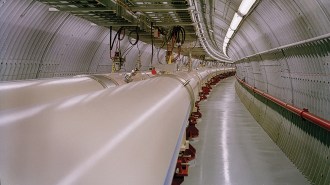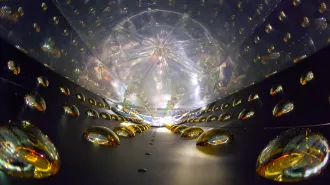Radioactive beryllium-7 atoms locked inside molecular cages decay extraordinarily quickly, Japanese researchers have found. The speedup is the largest such artificial hastening of an atom’s decay rate ever observed.
Tsutomu Ohtsuki of Tohoku University in Sendai and his colleagues recorded a nearly 1 percent hike in the decay rate of beryllium-7 atoms that were each trapped inside a spherical shell-like, 60-carbon molecule known as a buckminsterfullerene, or buckyball.
A beryllium-7 nucleus decays into a lithium-7 atom by absorbing an electron, which converts a proton into a neutron. Inside a buckyball, the cage’s electron cloud may hem in the beryllium-7’s electrons so tightly that the chance of an electron-proton interaction goes up, the scientists propose in the Sept. 10 Physical Review Letters.
Such a large boost is remarkable because conditions that influence matter on the scale of atoms or larger—such as pressure and the chemical environment—typically exert almost no influence at the smaller scale of nuclear matter.







